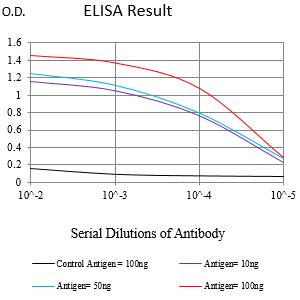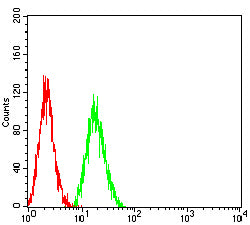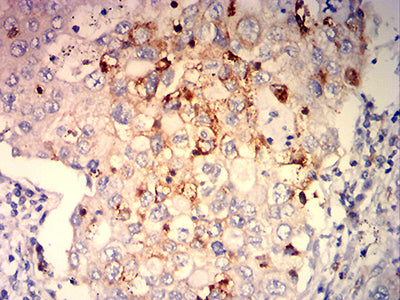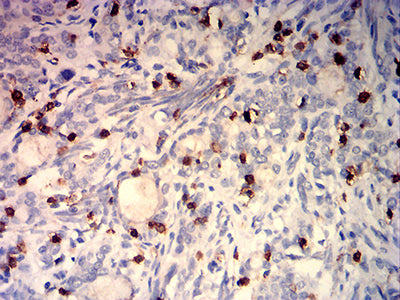



| WB | 咨询技术 | Human,Mouse,Rat |
| IF | 咨询技术 | Human,Mouse,Rat |
| IHC | 1/200 - 1/1000 | Human,Mouse,Rat |
| ICC | 技术咨询 | Human,Mouse,Rat |
| FCM | 1/200 - 1/400 | Human,Mouse,Rat |
| Elisa | 1/10000 | Human,Mouse,Rat |
| Entrez GeneID | 3695 |
| clone | 1B4A8 |
| WB Predicted band size | 86.9kDa |
| Host/Isotype | Mouse IgG1 |
| Antibody Type | Primary antibody |
| Storage | Store at 4°C short term. Aliquot and store at -20°C long term. Avoid freeze/thaw cycles. |
| Species Reactivity | Human |
| Immunogen | Purified recombinant fragment of human ITGB7 (AA: 20-174) expressed in E. Coli. |
| Formulation | Purified antibody in PBS with 0.05% sodium azide |
+ +
以下是关于ITGB7抗体的3篇参考文献及其摘要简述:
1. **文献名称**:*Targeting integrin α4β7 in inflammatory bowel disease: a review of clinical evidence*
**作者**:Feagan BG, et al.
**摘要**:探讨抗ITGB7(整合素β7)抗体在炎症性肠病(IBD)治疗中的作用,通过阻断α4β7整合素与黏膜地址素MAdCAM-1的相互作用,抑制淋巴细胞向肠道迁移,从而减轻炎症反应。
2. **文献名称**:*Structural basis of integrin β7 antibody inhibition in immune cell trafficking*
**作者**:Liu L, et al.
**摘要**:通过冷冻电镜解析ITGB7抗体与α4β7整合素的复合物结构,揭示抗体阻断配体结合的分子机制,为优化抗体药物设计提供结构生物学依据。
3. **文献名称**:*Anti-β7 integrin therapy inhibits gut-homing T cells and ameliorates colitis in preclinical models*
**作者**:Rivera-Nieves J, et al.
**摘要**:在小鼠结肠炎模型中,抗ITGB7抗体通过抑制T细胞向肠道归巢,显著减少肠道炎症和病理损伤,验证了靶向β7整合素在自身免疫疾病中的治疗潜力。
4. **文献名称**:*Integrin β7 as a biomarker and therapeutic target in T-cell malignancies*
**作者**:Wang X, et al.
**摘要**:研究发现ITGB7在特定T细胞淋巴瘤中高表达,抗ITGB7抗体通过诱导肿瘤细胞凋亡和抑制迁移,为相关癌症的靶向治疗提供了新策略。
**Background of ITGB7 Antibody**
Integrin β7 (ITGB7) is a subunit of heterodimeric cell surface receptors that mediate cell-cell and cell-extracellular matrix interactions. It pairs predominantly with α4 (ITGA4) or αE (ITGAE) subunits to form integrin α4β7 or αEβ7. respectively. These integrins play critical roles in immune cell trafficking and tissue-specific homing. α4β7 binds to mucosal addressin cell adhesion molecule-1 (MAdCAM-1), facilitating lymphocyte migration to gut-associated lymphoid tissues, while αEβ7 interacts with E-cadherin, promoting retention of intraepithelial T cells in mucosal surfaces.
ITGB7 is highly expressed on lymphocytes, particularly gut-homing T cells, B cells, and innate lymphoid cells. Dysregulation of ITGB7-mediated signaling is implicated in inflammatory bowel diseases (IBD), such as Crohn’s disease and ulcerative colitis, as well as autoimmune conditions and cancer metastasis. Antibodies targeting ITGB7 or its α4β7 heterodimer (e.g., vedolizumab) are therapeutic tools designed to block leukocyte infiltration into inflamed tissues, thereby reducing chronic inflammation.
Research on ITGB7 antibodies also explores their role in modulating immune responses in oncology, such as enhancing antitumor immunity or inhibiting metastasis. Current studies focus on optimizing antibody specificity, understanding tissue-selective inhibition, and minimizing systemic side effects. ITGB7 remains a promising target for precision therapies in immune-mediated disorders and cancer.
×